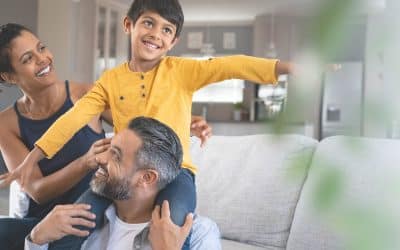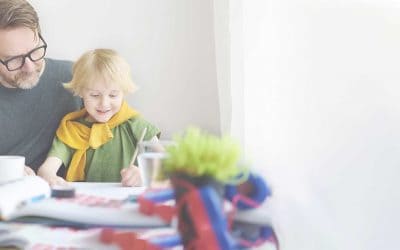Do your kids seems anxious?
Let’s talk about how anxious parents can lead to anxious kids.
A few years ago, I had a camper that lost it. I can’t tell you where she’s from or anything else about her except to say that at age 12, this lovely child fell apart. I’d known her for years, and she’d always been fantastic, a joy to be around.
Then, mysteriously, anxiety stole her well-being. She became an anxious kid.
She cried all the time; she talked non-stop about being anxious. At first, we listened, listened, and listened. But nothing helped. Finally, with some expert help, we came to understand that this lovely child was suffering from significant anxiety, and it was beyond us to help her.

Since then, I’ve come to understand anxiety disorders a bit.
Why? Because I see so much of it. Not always that severe, but significant enough to compromise kids’ well-being. The rise of the anxious child had been dramatic in the past decade.
Is this the fault of a changing world? Or is it we, the parents, who unknowingly inflict anxiety on our kids? Is it our fault?
Oh, the irony of being the first generation of parents in history to professionalize parenting and to discover that so many of our kids have self-esteem issues and don’t feel as comfortable in their skin as we’d hoped – and planned.
And there’s the rub – We planned!
We went into parenting believing we’d do it better than our parents did because we’d know more… and control more. We belong to the first generation of professional parents. We have blogs, speechmakers, parenting and school consultants, and a Kindle bookstore section with 32,172 titles! All these experts are telling us how to do it…. perfectly. This is impossible and makes us simultaneously well-informed and over-controlling, thanks to the illusion of possible parenting perfection.
“We planned! We went into parenting believing we’d do it better than our parents did because we’d know more… and control more. We belong to the first generation of professional parents.”
This enticing illusion comforts us – in the short term. Whoopee, I have control over my children’s lives! I can keep them safe… and happy! But over time, this desire for – and fantasy of – control – makes us feel more anxious. It’s a paradox. The more we control their lives, the more anxious we get because there is no such thing as actual control over others’ lives. And their road does have bumps. So the more anxious we get, guess who inherits our anxiety? It’s more contagious than the flu!
The other problem with making everything right for our kids is that we then shield them from developing their resourcefulness. How to help a child with anxiety? Stop protecting them from failure, from hurt, from everything negative. We deny them the opportunity to pick themselves back up from defeats and hurts, from boo-boos, both physical and psychological. So they don’t learn those critical essential life skills.
Even more damaging to their sense of competence and self-worth, every time we over-protect our kids, we’re sending them a clear nonverbal message: “You’re not resourceful. You can’t manage this on your own, so I have to do it for you.”
This is not a helpful message. It’s how our anxiety grows theirs.
Our fear about the world is the second reason for being control freaks. Is the world a scarier place than the one we grew up in? Is there more abuse, more bullying, are there more attacks on children? Most studies say no, but we have so much more information on those perils because we’re parenting in the instant info age, raising our anxiety level, expanding our desire for control.
“Every time we over-protect our kids, we’re sending them a clear nonverbal message: “You’re not resourceful. You can’t manage this on your own, so I have to do it for you.”
The problem of information is the third reason for our difficulty. We know too much, and our appetite for info about our kids is insatiable. This is not helpful. Our addiction to information about them does not make their lives better – or ours. On the contrary, it likely has the opposite effect on both them and us. Take the story of the bicycle. My young adult daughter rides her bike everywhere, including in the winter. When she comes home for dinner, I experience anxiety about her riding her bike back downtown, and I make her call me when she arrives. She says I’m silly because I neither know her whereabouts the other six nights of the week nor require a phone call when she gets home. She’s right. In this case (and in too many others), my knowledge does not make her safer.
The thing is – cutting the umbilical cord is the hardest thing we do. From the moment a child is born, we are programmed to love and protect that child. It comes naturally. Letting go does not. Allowing go of our children, giving them space to fail, hurt, and suffer life’s misfortunes, child-size, is the most challenging task before us. And perhaps the most important is to telegraph to them and ourselves that we trust them to manage. That we believe in their ability. That we feel safe, and we trust that they will be safe. And that’s a very tall order – for us.
And here is the unspoken truth; if your life solely revolves around your kids or “you don’t have a life of your own,” chances are you are that parent who goes into overdrive and kicks up a storm when you sense the tiniest harm befalling your kids. Well, you need to quit acting the super parent and get a life!
Go to the movies, go on dates, and invest in your interests and hobbies. Do anything that floats your boat apart from “meddling” in your children’s lives like the dramatic mother hen you are. Granted, it is not a crime to be passionately and genuinely invested in your children’s activities and problems. Still, you need to know where to draw the line between “good parenting” and “anxious parenting.”
If your child mistakenly grazes their arm while playing, understand that a bit of bandage or gauze will solve the problem; instead of acting like apocalypse zombies are about to infest your beautiful home, and you need to don on your super cop uniform and supervise future playing activities like a hawk.
Don’t overestimate the dangers kids face – relax to minimize the risk of having anxious children.
Your teenage kid stays out a little too late? No problem, because this is an excellent opportunity to enjoy a good bottle of wine or Netflix and chill rather than leaving a gazillion voicemails or blowing up their phones with calls. Learn to take a deep breath and relax.
Crazy as it sounds, we tend to overestimate the dangers surrounding our kids, no thanks to the chaotic world and the shitload of negative information exposed to. But overacting, overparenting, or getting your blood pressure up to an insane degree is of little consequence to the “positive outcome” of events. You’d only succeed in doing you and your kids more harm than good. So again, get a life and stop suffocating your kids with the attention they don’t need. If you have an anxiety disorder, please see care from your healthcare provider. Your child may be at an increased risk of developing an anxiety disorder too. We want to identify a child’s anxiety and treat it as early as possible to prevent it from affecting the child’s life and leading to further mental health concerns.
The first step in helping an anxious child and preventing an anxiety disorder
Okay, I admit that leaving your kids to their own devices and snapping out of the anxious realm is easier said than done. Our good friend “anxiety” is a tough nut to crack. But the first step to defeating anxiety is to acknowledge the sneaky worm. Say, “I am not a good parent; I am simply anxious.” When you cross this seemingly challenging yet straightforward bridge, then go on to confront the elephant in the room.
A good rule of thumb is to evaluate your anxious actions─ really, why are you worried? How does your child perceive your behavior?
Are they comfortable sharing their problems, or do you detect a wall? Do you notice a reversal in roles, your child has become the “shielder,” steering you away from their issues because you’d make a mountain out of a molehill?
Is your child a risk-taker or a scaredy-cat?
Individual answers you come up with will tell you all you need to know and how you can dampen the fear.
So, if you catch yourself being the anxious parent, stop in your tracks, take a deep breath, and remember that your child is more robust and braver than you give them credit for. And don’t go being an overly permissive parent just because you are trying to give your child some breathing space.
There is a difference between anxious parenting and letting your child get away with bad behavior. Tell you what, there are no one-size-fits-all rules or manual for parenting, but what you shouldn’t do is give “fear” the upper hand.
FAQ – Frequently Asked Questions
Q: What are the common symptoms of anxiety in kids?
A: Children’s anxiety can present in various ways, including abdominal pain, headaches, or chronic fatigue when they feel anxious. Some young people with panic disorder have panic attacks with physical symptoms like sweating or turning pale. They feel anxious and experience negative thoughts like feeling they might die, pass out or vomit. Many children with childhood anxiety have fears of leaving their parents or having caregivers get sick or die.
Q: How often do children develop anxiety?
A: Anxiety disorders affect up to 20% of young children and older children. Not all anxious children meet criteria for an anxiety disorder but may suffer from separation anxiety or social anxiety. In addition, many children feel anxious occasionally but do not meet criteria for mental disorders. Please review your child’s anxiety with your healthcare provider If you are worried about childhood anxiety disorders.
Q: How is an anxiety disorder treated?
A: Anxiety disorders are often treated by a mental healthcare professional. Sometimes cognitive behavioral therapy is utilized to help the child manage their negative thoughts, social anxiety disorder, or separation anxiety. Sometimes children with anxiety disorders will work with a child or adolescent psychiatry. Most anxious children do not require medication for their anxiety.
Q: When should I worry about anxiety disorders in kids?
A: Young children with anxiety should be assessed by their healthcare provider. Anxiety can significantly impact a child’s life. Young kids and older children with anxiety symptoms should receive mental health assessments.
Q: What does child or adolescent psychiatry do in a mental health assessment?
A: In an evaluation of a child’s anxiety, anxiety symptoms and physical symptoms are reviewed. In the mental health assessment, the clinician will assess for all these symptoms and the child’s fear to determine if they meet criteria for a mental health condition. They will be evaluated for medical conditions. They will review treatment options with you.
A psychiatrist may refer to a trained therapist to seek professional support.
Q: What are the most common mental health problems for kids?
A: Younger kids more commonly experience symptoms of anxiety where they have emotional distress related to their health and safety and that of their family members. They may have separation anxiety, which may lead to a change in a child’s behaviors such as clingy behavior, frequent crying, poor diet, or changes in sleep. They may have an extreme fear of being alone and may be too scared to attend school. Younger children with anxiety may experience stomach aches and may avoid school or social gatherings. Professional help can allow your child to feel their best.
The good news is that most kids with anxiety can get the social support they need to decrease their anxiety and feel better.
Since 1989 Joanne Kates has been Director of Camp Arowhon, a residential children’s summer camp in Algonquin Park, Ontario. Camp Arowhon has been home away from home for children since 1934; under Joanne’s leadership it is celebrated for pioneering achievements in creating social safety for children. Joanne developed the Camp Arowhon Social Safety Tool Kit, which includes anti-bullying prevention and intervention strategies that have made Arowhon a haven from bullying and girl cliques. Joanne speaks on parenting at schools snd community organizations. Her writing on parenting appears in The Globe and Mail and Post City Magazines.












